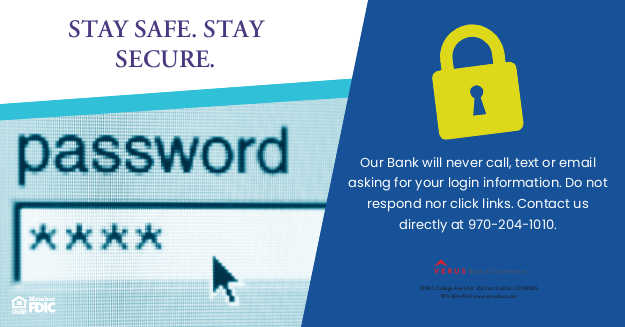
Important Notice: Phone Scam Alert
Dear Customer,
We want to alert you to a recent phone scam targeting bank customers. Fraudsters are spoofing caller ID to display the bank’s name and phone number, making it appear as though the call is coming from Verus Bank of Commerce.
These callers often impersonate bank employees—sometimes even using the names of real staff members—and claim there is an incoming ACH deposit. They then ask for your online banking password. In some cases, they may already know your username. Once they have your login credentials, they can access your account and initiate unauthorized ACH withdrawals.
Please remember: Verus Bank of Commerce will never ask for your online banking password over the phone.
If you receive a suspicious call, hang up immediately and contact us directly using the phone number listed on your bank statement or on our official website.
To safeguard your account, our staff may contact you to verify your identity—but we will never ask for your password.
Stay alert. Protect your information.
Every individual can take simple steps to improve their cyber hygiene and protect themselves online. In fact there are 4 things you can do to keep yourself cyber safe. CISA urges everyone to practice the following:
- Implement multi-factor authentication on your accounts. A password isn’t enough to keep you safe online. By implementing a second layer of identification, like a confirmation text message or email, a code from an authentication app, a fingerprint or Face ID, or best yet, a FIDO key, you’re giving your bank, email provider, or any other site you’re logging into the confidence that it really is you. Multi-factor authentication can make you 99% less likely to get hacked. So enable multi-factor authentication on your email, social media, online shopping, financial services accounts. And don’t forget your gaming and streaming entertainment services!
- Update your software. In fact, turn on automatic updates. Bad actors will exploit flaws in the system. Update the operating system on your mobile phones, tablets, and laptops. And update your applications – especially the web browsers – on all your devices too. Leverage automatic updates for all devices, applications, and operating systems.
- Think before you click. More than 90% of successful cyber-attacks start with a phishing email. A phishing scheme is when a link or webpage looks legitimate, but it’s a trick designed by bad actors to have you reveal your passwords, social security number, credit card numbers, or other sensitive information. Once they have that information, they can use it on legitimate sites. And they may try to get you to run malicious software, also known as malware. If it’s a link you don’t recognize, trust your instincts, and think before you click.
- Use strong passwords, and ideally a password manager to generate and store unique passwords. Our world is increasingly digital and increasingly interconnected. So, while we must protect ourselves, it’s going to take all of us to really protect the systems we all rely on.
Source: https://www.cisa.gov/shields-up

